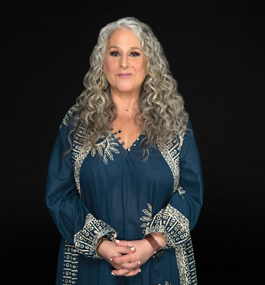The Brandeis Questionnaire
Marta Kauffman ’78

Kirk McKoy / Los Angeles Times / Contour
Marta Kauffman
Marta Kauffman ’78 has become a TV titan by exercising a very human superpower: She writes great stories and develops popular franchises, powered by positive messages delivered with irresistible sass and no trace of treacle. Sure, life can be messy and disappointing, her shows remind us. So laugh. Lean on others. Look for the good stuff that might be glinting just out of view. And keep moving forward.
Kauffman’s first industry game changer was the NBC situation comedy “Friends,” which, following its debut 25 years ago, became appointment viewing for the 20- and 30-somethings who saw themselves in the ensemble cast and their story lines. Co-created and executive produced by Kauffman and David Crane ’79 (who met at Brandeis when they were cast in a student production of Tennessee Williams’ “Camino Real”), “Friends” ran for 10 years; was nominated for 62 Emmys; and, thanks to its presence on streaming services, remains wildly popular with new generations of viewers.
Now she’s masterminded another blockbuster, Netflix’s “Grace and Frankie,” which she also co-created and executive produces. Starring the indomitable Jane Fonda and Lily Tomlin, with a supporting cast of heavy hitters, the show is a funny, heartfelt ode to figuring out your best life, whichever side of 65 you’re on. Earlier this year, its ageless appeal was underscored by an admiring “Saturday Night Live” skit, in which Pete Davidson, Paul Rudd and DJ Khaled rapped about why it’s their favorite show (take that, “Game of Thrones”). A magnet for critical acclaim and industry awards, “Grace and Frankie” has been greenlighted for a sixth season.
To keep the airwaves humming with content that’s entertaining and empowering, Kauffman co-founded a female-led production company, Okay Goodnight, which is overseeing the development of a variety of women-centric comedies, documentaries and dramas, including an adaptation of Karen Joy Fowler’s 2013 novel, “We Are All Completely Beside Ourselves.”
In February, Kauffman was honored by Humanitas, a nonprofit that mentors and supports TV and film writers, which gave her its Kieser Award in recognition of the humanitarian impact of her lifetime body of work.
What was your idea of perfect happiness when you were at Brandeis?
Playing Bruce Springsteen out my window onto the quad and dancing like a fool.
Who was your favorite Brandeis professor?
So many of them made a huge impact on me. The one who stands out is my Women in Literature professor,
Andre Collard. She taught me the true meaning of feminism and the importance of self-determination.
Where did you usually spend Saturday night?
Probably doing something at Spingold Theater. Or having pizza and Hawaiian Punch with my friend Deb; we met our first week of school and remain best friends to this day.
What is the most important value you learned at Brandeis?
Brandeis taught me how to be a human being, both personally and in the larger world.
What was the most important shortcut you learned in college?
If anything, I’d say I learned shortcuts aren’t the answer and delving deep is far more important.
Which talent did Brandeis help you develop most?
Brandeis gave me the freedom and the opportunity to develop my skills as a storyteller. Also, I was an actor at the time, and many professors helped me understand the process an actor goes through to make a role come alive, which has informed my writing and directing for all these years.
What three words of advice would you give to current Brandeis students?
Explore, study, enjoy.
What do you wish you had studied harder?
I wish I had spent more time studying in my Marx and Freud class.
If you could go back to college, what would you do differently?
I would work harder on things other than theater and ask for help when I needed it.
If you could be any other Brandeisian, who would it be?
Justice Brandeis.
What would your friends say is your greatest weakness?
My inability to say no.
What is your blind spot?
I’m sure I have one — I just seem to be blind to it.
What book do you read again and again?
“To Kill a Mockingbird” and “We Are All Completely Beside Ourselves.” Very different books, but both move me to my core.
What movie changed your life?
“Terms of Endearment.” That’s the movie that made me say, “I wish I’d written that.” It walks the line of comedy and drama so artfully. I aspire to work like that.
